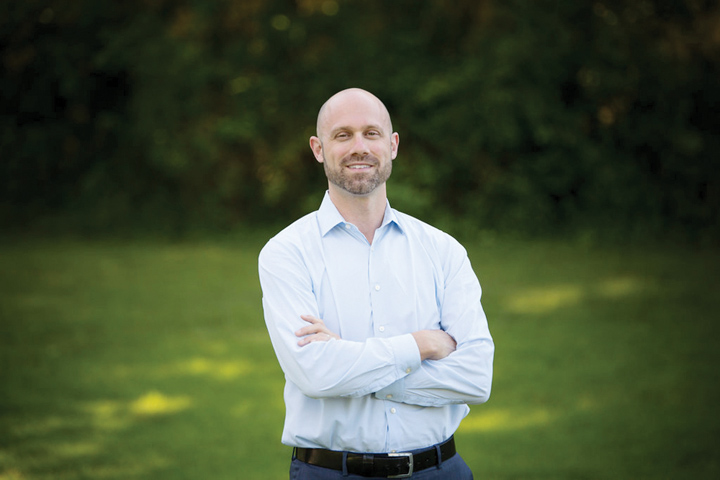
About six years ago, Dr. Nate Bergman started losing his memory, and it shook him.
He was buying new tires for his wife’s car one day, and the attendant asked him for his home address. Despite having lived there for a couple of years, he couldn’t remember it.
This would unnerve most anyone, but Bergman is an osteopathic physician, and at that time he was doing a residency in functional medicine at the Cleveland Clinic in Cleveland, Ohio, so he was particularly unnerved.
“It was an indescribably frightening thing to not be able to remember some things,” he said. “You couldn’t really speak about this with anybody because you’re worried that you’d lose your livelihood.”
Bergman is 42 and lives in the Cleveland area. He was born at the University of Kansas Medical Center in Kansas City, Kansas, grew up in Overland Park, attended Chabad House and graduated from Hyman Brand Hebrew Academy in 1994. He lived in Israel from 1996 to 2004 and decided while he was there that he wanted to become a physician.
He was in his 30s when the memory loss started, relatively young for such symptoms to surface, he said. He went to see a neurologist for brain testing and tried various medications, but the solution came through making lifestyle changes, including improving his diet, getting sufficient sleep, meditating and combining resistance training and aerobic exercise.
He had first learned about functional medicine starting about six years earlier, during his first year in medical school, “so the seeds were planted.”
“God gives the cure before he gives the malady,” he said.
Functional medicine is an emerging specialty based on the body’s biological systems and focusing on identifying and treating root causes of diseases, according to The Institute for Functional Medicine.
Bergman’s interest and work in Alzheimer’s and other degenerative brain disorders prompted him to start doing a podcast called “Evolving Past Alzheimer’s” last year on his website, evolvingpast.com. He addresses topics including emerging technologies, transhumanism (the theory that people can evolve beyond their current physical and mental limitations, especially by using science and technology), traditional medicinal approaches, spiritual conversations, and stories of people living with Alzheimer’s. He also has conversations on the podcasts with experts worldwide on treatment and prevention of Alzheimer’s and other brain diseases.
His brother, Shmuel Bergman, co-produces the show and lives in Colorado. Their parents, Vic Bergman and Susan Bergman, M.D., live in Overland Park.
The name “Evolving Past” grows from the idea of trying to reconcile the challenges of living in the second half of your life in an increasingly digital and synthetic culture.
“I had wanted to do the podcast for a few years but didn’t have time,” Bergman said. “I talk about translational medicine, which involves taking research from the bench to the bedside — out of the lab to positively affect human health.”
Bergman is convinced that Alzheimer’s and other brain diseases are generally treatable and reversible. He is a board certified physician specializing in functional medicine with a focus on brain health and prevention and treatment of early Alzheimer’s disease and other neurodegenerative conditions. He also is clinical assistant professor of medicine at the Cleveland Clinic, where he has worked since 2015, and he works in a large tertiary care hospital in Cleveland.
Progress has been made in understanding and treating Alzheimer’s, but much more work is necessary, he said.
“If we understood it, we would have a cure,” he said. “Now, I think many of the mechanisms are further and further described. There have been 500 studies and hundreds of billions of dollars spent, but there hasn’t been much effect on addressing the degenerative process at this this point.”
What does seem clear is that the sooner people identify their symptoms such as trouble with thinking, performing a variety of normal tasks and organized executive functioning, the better, he said. The presence of any of these symptoms is good reason to go to a physician who can perform a cognoscopy, which is a series of tests that can include an MRI with computer scoring of functionality of different areas of the brain, blood work and a history of exposure to environmental toxins and the incidence of head injuries.
Bergman received a Bachelor of Science degree in Biology from Lander College for Men in Kew Gardens Hills, New York, in 2006, and a medical degree from the Kansas City University of Medicine and Biosciences in Kansas City, Missouri, in 2011. He did a residency from 2011 to 2014 at the Cleveland Clinic.
He received an Intramural Research Training Award in medicinal chemistry and drug design at the National Institutes of Health, worked for Cerner Corp. and did fellowship training in geriatric medicine at the Cleveland Clinic.
Bergman’s advice for people who experience early signs of what could be Alzheimer’s or other brain disorders is simple.
“Don’t ignore stuff,” he said. “When stuff starts coming up in your 40s through your 70s, get it checked out. Don’t assume there’s nothing to do about it.”



